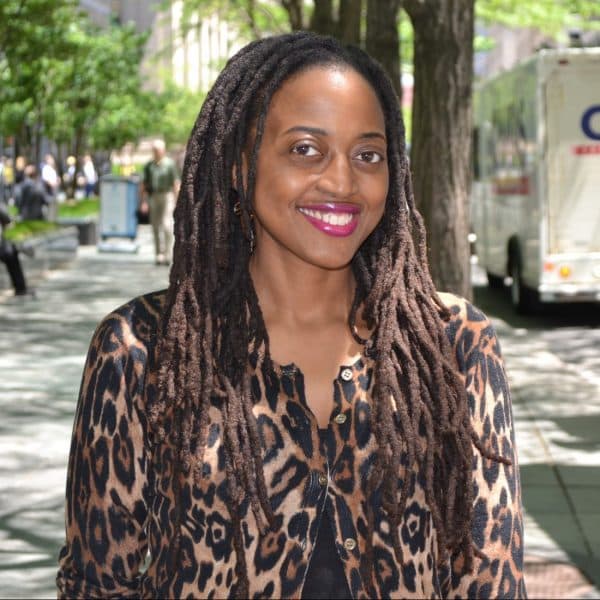Advertisement
Wayne Shorter and esperanza spalding bring operatic Greek tragedy '... (Iphigenia)' to life
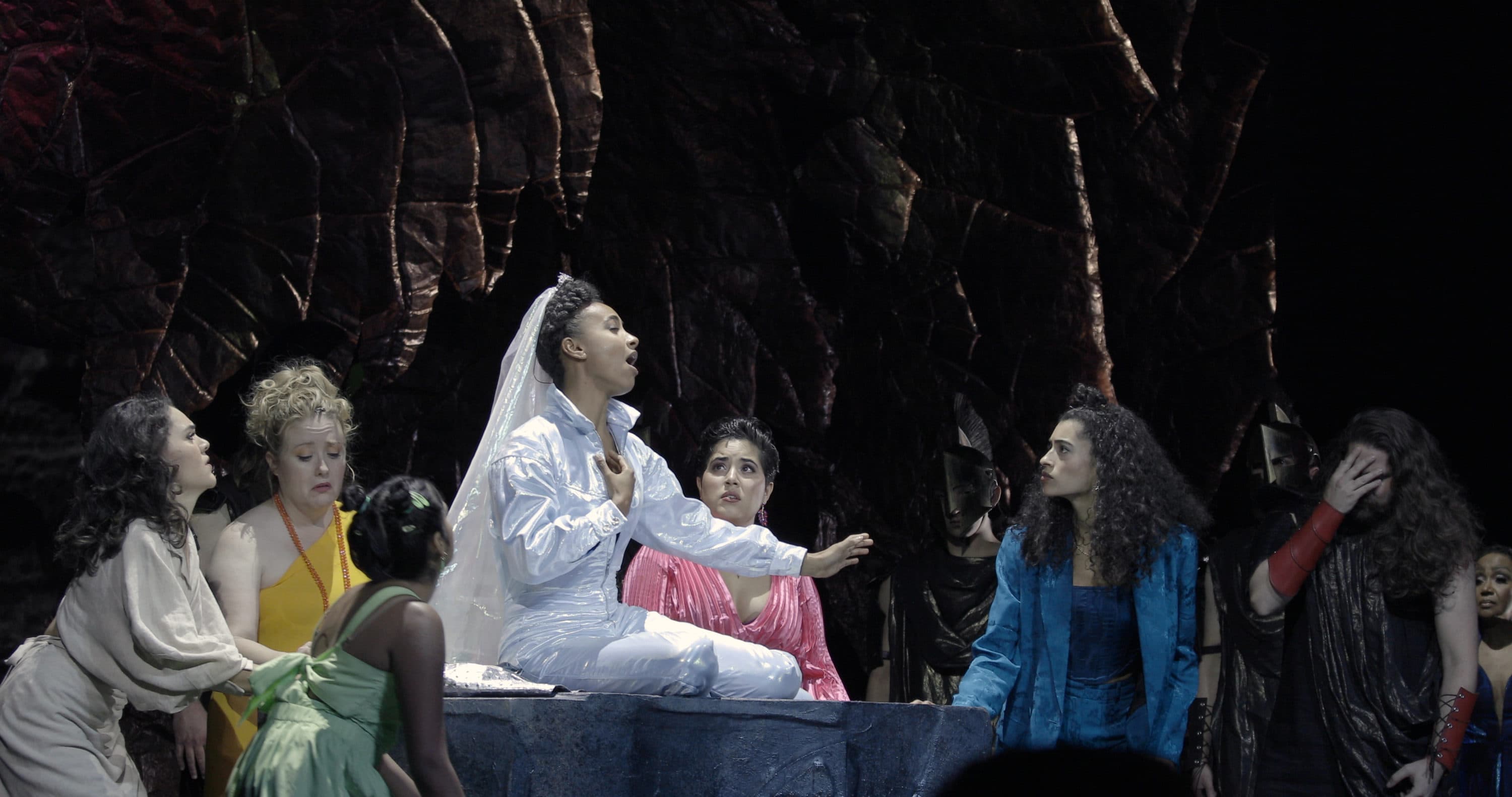
Grammy-award winning musician and singer esperanza spalding's voice is restorative.
As a creative, she aspires to ignite and illustrate the kaleidoscopic "hues of vital human energies." Over the years, she's continued to push the boundaries of her body of work with her albums "Junjo" (2006) to "Emily's D+ Evolution" (2016) to her most recent effort, "Songwrights Apothecary Lab" (2021), which explores music as a tool for healing. The project was developed in a traveling creative space where spalding was joined by researchers, music therapists, neuroscientists, musicians and others to make music designed to have a specific effect on the listener. A companion guide offers information on the songs, or "Formwelas," intended effects.
It's fitting then that spalding likens her latest role helping to shape the opera "... (Iphigenia)," with legendary saxophonist, composer and mentor Wayne Shorter to that of a doula, supporting and moving things along. Shorter — who was the primary composer for the Art Blakey Jazz Messengers, played with the Miles Davis Quintet and now leads his own quartet — has been dreaming of bringing an opera to fruition for nearly a decade. Now his dream, with the help of very talented friends, will finally be realized. Shorter's "... (Iphigenia)," presented by Arts Emerson and the New England Conservatory, premieres in Boston on Nov. 12.
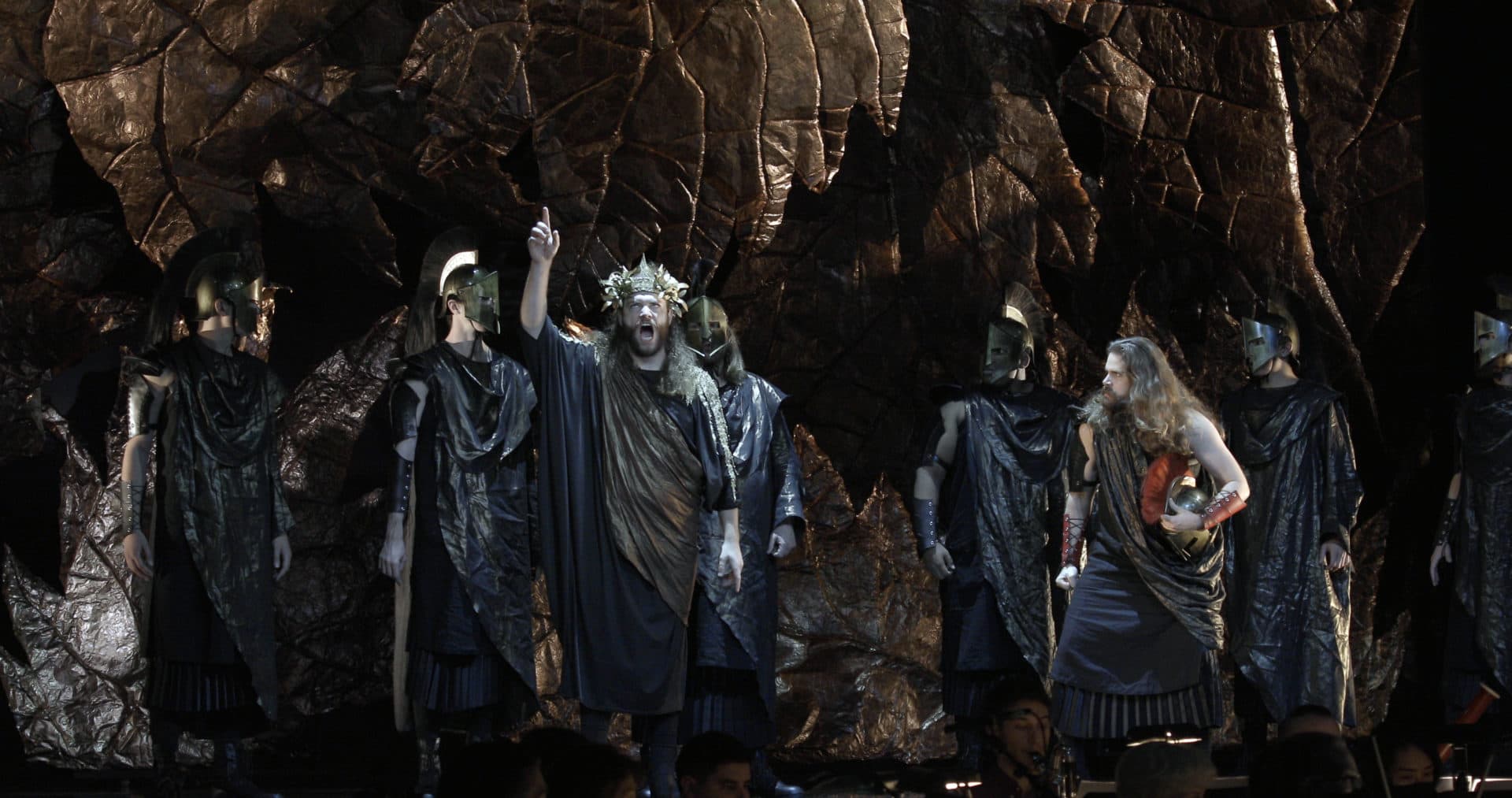
In Greek mythology, Iphigenia, the daughter of King Agamemnon and Queen Clytemnestra, is sacrificed in exchange for favorable winds from the gods in a time of war. But Shorter and spalding's project is not a retelling of the myth but an intervention. The full orchestral score features classical and jazz music and uses Shorter's method of symphonic improvisation.
The opera's creative team, full of artistic leaders, includes Obie Award-winning director Lileana Blain-Cruz, famed architect Frank Gehry, costume designer Montana Levi Blanco, Pulitzer Prize-winning musician Caroline Shaw and conductor Clark Rundell. spalding serves as the librettist and a vocalist for the show.
The journey to developing "… (Iphigenia)" was punctuated with fundraising challenges, health scares and writing struggles. But spalding, Shorter and the rest of the team pushed on. Celebrated producer Jeff Tang and spalding co-founded the company Real Magic to independently produce the opera and launched an Indiegogo campaign to raise money.
The show received support from myriad organizations, including the Ford Foundation, the Andrew W. Mellon Foundation, the Doris Duke Charitable Foundation and online donations. "The collection plate was massive," spalding says.
As far as the writing of the libretto, spalding says, "I think I suffered from too many ideas.” Part of the challenge was that Shorter had already written the music, she explains. spalding says she drafted about five versions of the opera and none of them worked. She received help from dramaturg Avery Willis Hoffman. Hoffman told spalding that "Toni Morrison once said to her that writing is suffering.'"
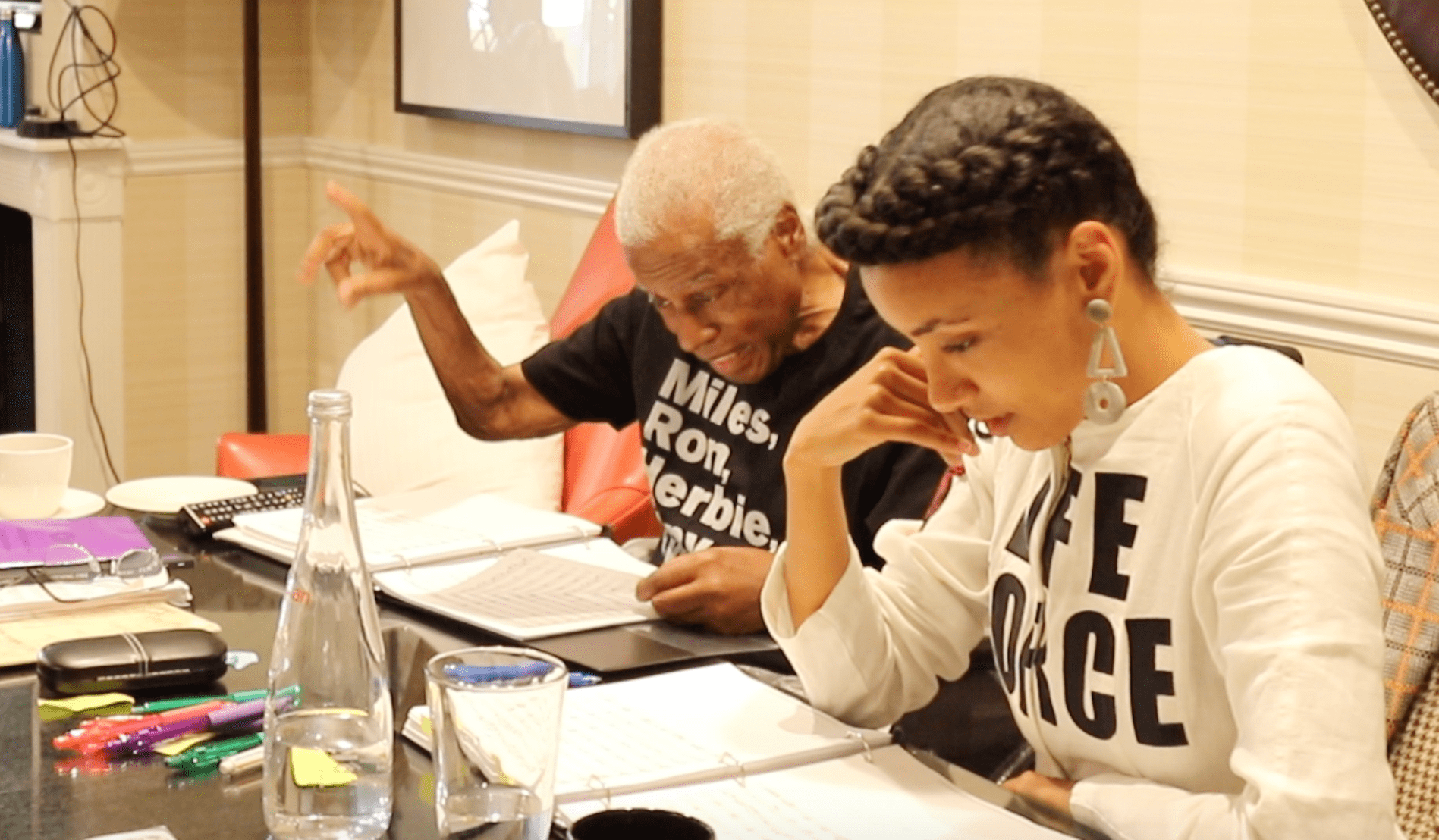
"The joy, the gift, comes when these moments of illumination can come through,” spalding recalls. “She was trying to help me understand that maybe unlike my other artistic practices, it’s not very fun, the slog of trying to create shape and spirit and structure with language.” Once she accepted that, things got easier. She also received a little help from a dream. Upon waking, she remembered a phrase, "Sound is mass, and it grows things." In her previous writing attempts, she didn't look to the music to tell her the words. She was trying to draft stories to fit the music. Finally, spalding "let the arc of music show its language and story," she says. After that, she could bring back in and fit into the melody, language and poetry that had worked.
If that wasn't enough of a snag, for a time Shorter wasn’t very mobile, nor was he able to orchestrate his music. He was going through a difficult health situation where he lost the ability to write with his hands. To help, spalding says, "We essentially brought a small orchestra to him to play his piano reduction." Before a composer does a full orchestration, "they'll make a sketch that's kind of like a condensed version of everything that they're hearing that will go in the full piece that can just be played on piano," she explains. Up to that point, that's what Shorter had written. At the time, having the orchestra play the piano reduction allowed Shorter to tell the group what he wanted more or less. "That's supposed to be in the violins, that’s supposed to be in the brass, that's supposed to be the timpani, or that's supposed to be in the percussion," spalding says, imitating Shorter’s instructions. They did this nearly every weekend for months until Shorter regained the ability to write by hand and orchestrate out his ideas the way he typically does with a paper and pen.
With the rough roads behind them, director Blain-Cruz and costumer Blanco aimed to craft a world that is "both clear in and of itself and yet open to shifts and changes," she says. To do that, the creative team explored "the repeated cycles of the myth,” Blain-Cruz says. “In this version of the story, it's not just one Iphigenia; there are multiple."
In the opera, spalding wanted to explore dissolving the singular narrative, the hero narrative. So, she invited three women of different ancestries — Indigenous poet laureate Joy Harjo, author and poet Safiya Sinclair and vocalist Ganavya Doraiswamy — to help write Iphigenia's voice.
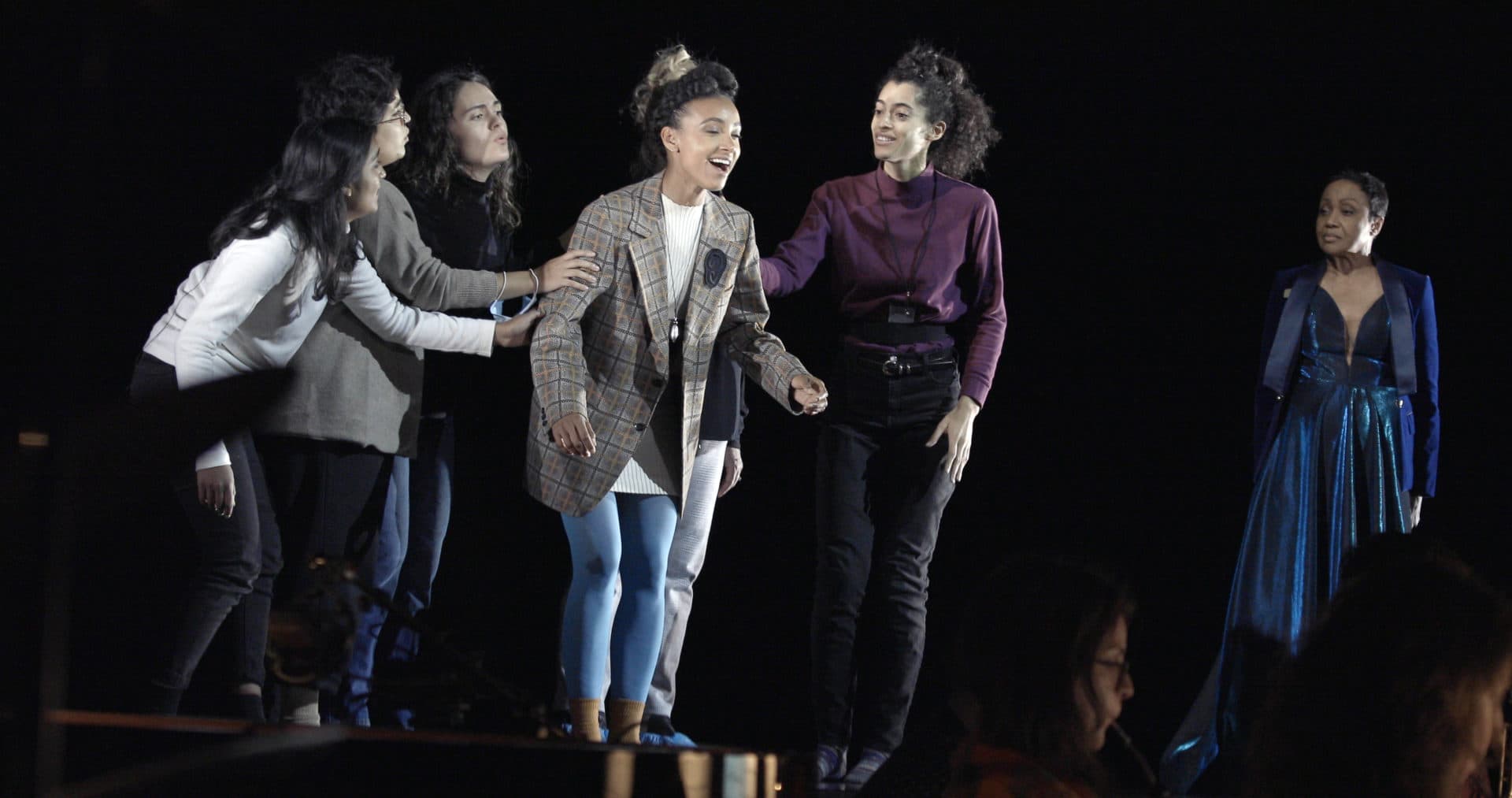
Onstage, Blain-Cruz and the team worked to center the act of sacrifice and ways to understand the multiplicity of these stories. "That landed us in a beautiful backdrop Frank [Gehry] designed that has a transformation in the second act," Blain-Cruz says. In Act 2, there's a dark void, a void of spirit, of all who've passed, the void of all the Iphigenias that never had a voice in their operas, stories or mythology take over. Since the audience gets to hear from the Iphigenias, the world is one where women are at the center, Blain-Cruz shares.
"There's a combining of both antiquity and modernity that Montana [Levi-Blanco] helps construct," Blain-Cruz says. The soldiers wear helmets with mohawks on them, which derives from the Grecian sculptures, and modern military boots. All the Iphigenias are in acidic bright colors that bring us to the forefront in our modern contemporary palette, Blain-Cruz says. "So, you have that collision between the ancient and the modern kind of in the bodies of the performers."
Much of the opera takes place in the forest. In the third act, Gehry designed gold and copper leaves "that emphasize a mixture between being lost in Artemis' forest but also the military uniform. I think it becomes a massive structure that we understand to be part of the myth that we watch break apart as we open into something new at the end,” Blain-Cruz explains.
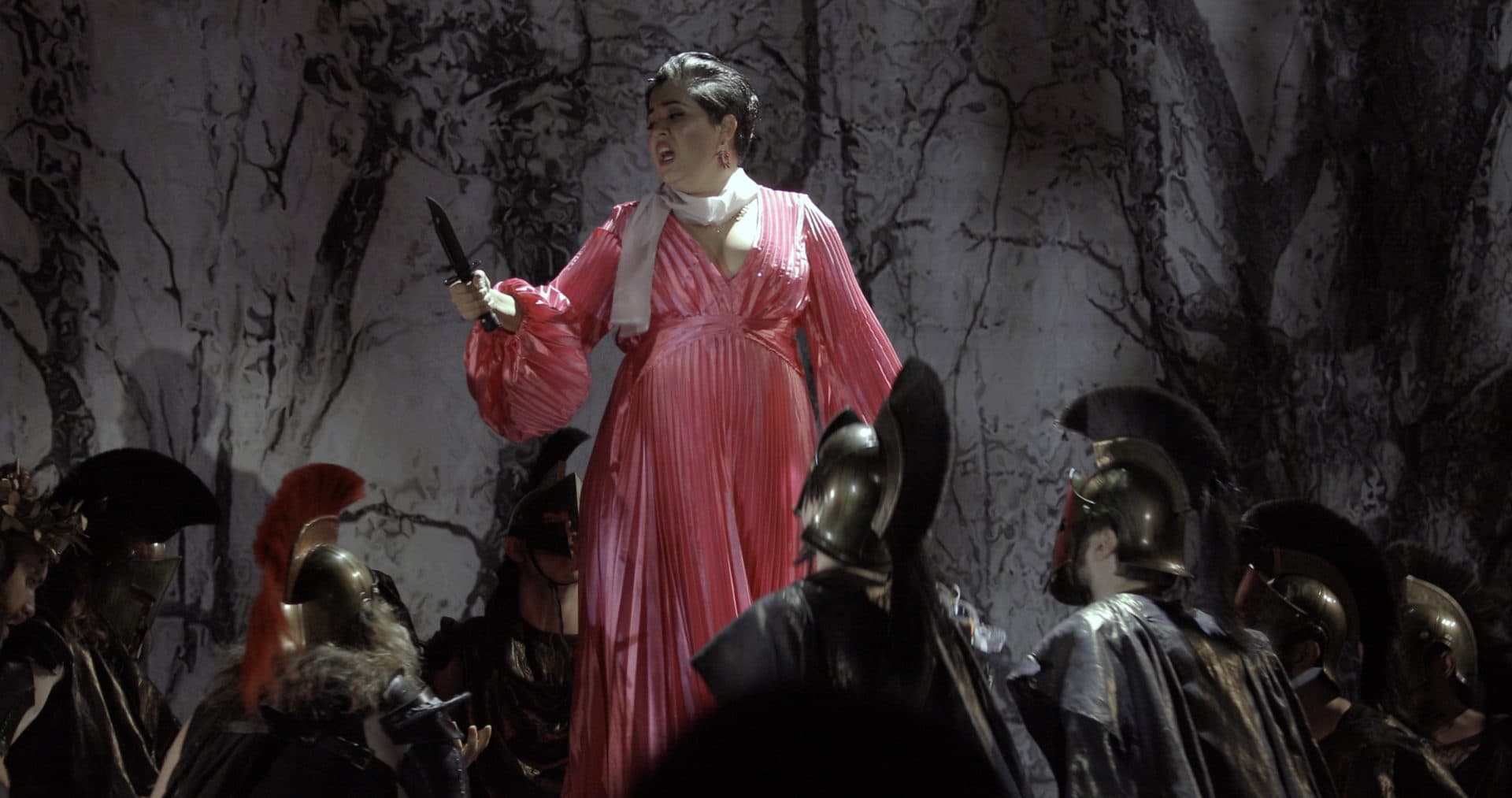
spalding hopes this work does many things. She wants people to know Shorter's music, specifically this part of his music. She also hopes audiences come away with something, whatever that might be.
"I trust the unknown that comes into space when many people are performing and giving their best, and I hope people feel what they need to feel on that night — to touch into their deep capacity to sense beauty and sense that spirit that can move through artistic beauty," spalding says.
After being isolated for so long, Blain-Cruz is thrilled about being in space with people making music and telling a story together. She wants people to leave "feeling lifted and alive and vibrating with that energy and feeling hopeful and excited about the potential changes that could come if they want them to."
Who knows, maybe Shorter and spalding's approach to "... (Iphigenia)" can be its own kind of salve for the many women who have been swallowed up in narratives onstage or real life.
“… (Iphigenia)” premieres Nov. 12 at ArtsEmerson’s Cutler Majestic Theatre.
